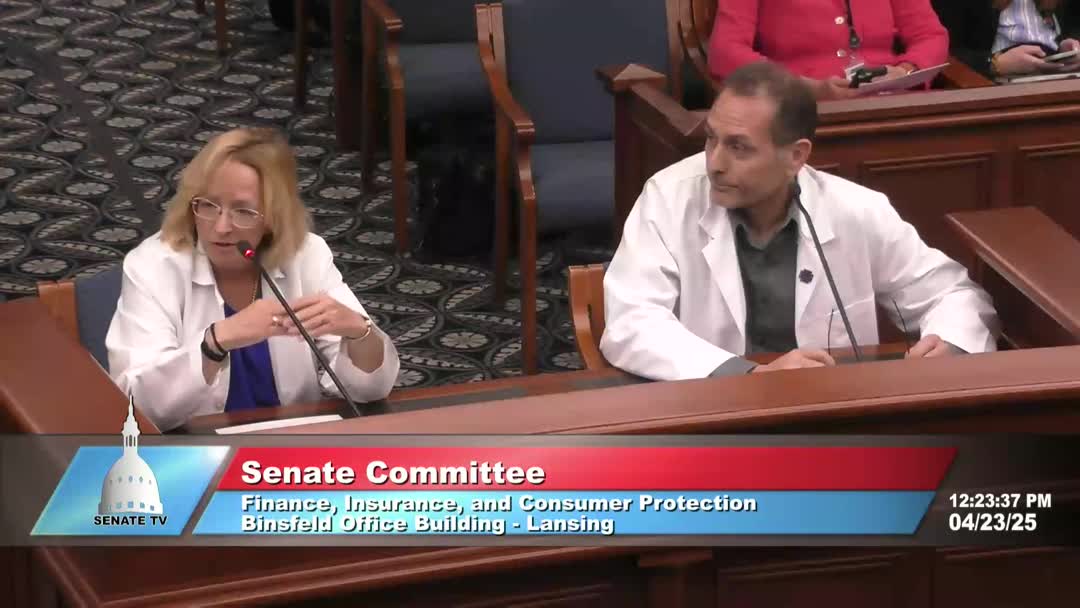Michigan committee advances package to create prescription drug affordability board after hours of testimony
Get AI-powered insights, summaries, and transcripts
Subscribe
Summary
The Committee on Finance, Insurance and Consumer Protection advanced a three‑bill package on April 11 to create a Prescription Drug Affordability Board in Michigan, reporting Senate Bills 3, 4 and 5 to the Senate floor after extensive testimony and follow‑up questions.
The Committee on Finance, Insurance and Consumer Protection on April 11 advanced a three‑bill package to establish a Prescription Drug Affordability Board (PDAB) in Michigan, voting to report Senate Bills 3, 4 and 5 to the Senate floor after extensive testimony from patients, physicians, insurers and industry representatives.
Supporters said the board would give the state a tool to review abrupt price increases for the costliest medicines and, where appropriate, set upper payment limits to protect patients and public payers. Sponsor Senator Veronica Camilleri said, “It is a great day to lower the cost of prescription drugs for our residents,” and asked the committee to approve the bills so Michiganders can “afford their life saving medications.”
The board envisioned in the bills would identify drugs that impose high cost burdens, investigate sudden price hikes, and — in some circumstances — set statewide upper payment limits (UPLs) that apply across payers and providers. Proponents who testified included physicians and state medical groups, patient advocates and large membership organizations. Dr. Jane Courts, board secretary of the Michigan State Medical Society, told the committee that “the first side effect of any med is cost, and then we discuss the other side effects,” saying patients frequently skip or cut doses because of price.
Physicians and patient advocates described individual cases of harm they attribute to high drug prices — people rationing inhalers, skipping blood thinners and delaying or stopping treatments — and urged adoption of a PDAB to add transparency and price oversight. Rob Davidson, executive director of the Committee to Protect Health Care and an emergency physician, said such stories “just keep happening,” and described emergency care that followed from patients not affording inhalers or anticoagulants.
Supporters also cited other states that have enacted PDAB laws and early activity in Colorado. Jason Lukowski of AARP Michigan said the bills would help ensure “the best drugs in the world don’t work if you can’t afford them,” and noted AARP’s membership in the state and survey results showing concern about drug prices among older Michiganders.
Industry and some advocacy witnesses urged caution. Morgan Halloran, director of state policy for a pharmaceutical industry trade group that identified itself as “Pharma,” told the committee that “Pharma opposes the entire package” and argued PDABs could disrupt patient access, raise costs through coverage changes, and fail to lower out‑of‑pocket costs at the pharmacy counter. Industry witnesses and others pointed to the complexity of the supply chain — insurers, pharmacy benefit managers (PBMs), wholesalers and rebates — and said those factors determine what patients pay at the counter.
Opponents warned that an imposed UPL could reduce rebates that fund safety‑net programs and Medicaid, potentially requiring the state to appropriate additional dollars. Raynor Simmons of Community Access National Network said independent analyses in other states found a UPL could reduce rebate values and unintentionally harm Medicaid and support programs.
Committee members questioned witnesses about practical details: how a UPL would interact with Medicare and Medicaid reimbursement (Medicare and Michigan Medicaid use ASP+6 for certain products was cited), how quickly a board could act, and whether UPLs would actually reach patients at the pharmacy counter. Christine Shearer of the Michigan Association of Health Plans said distribution and wholesaling make it difficult to restrict availability of a drug in a single state and noted Colorado has begun a hearing process after its board selected initial drugs for review.
After testimony and questions the committee took a series of formal actions. The S‑1 substitute to Senate Bill 3 was adopted by voice vote and a roll call that produced eight yeas and zero nays. Later the committee voted to report SB3 as substituted, SB4 and SB5 to the floor with a recommendation that each bill pass. For each bill the clerk announced a tally of 5 yeas, 2 nays and 1 passed (recorded votes showed Chair Kavanaugh, Senator Erwin, Senator McCann, Senator Behr and Senator Camilleri voting yes; Senator Theis and Senator Daley voting no; Senator Huizenga recorded as passed/abstained in the final tally).
Votes at a glance • Adopt S‑1 substitute to SB3 — Adopted (8 yeas, 0 nays). • Report SB3 (as substituted) to the floor — Reported (5 yeas, 2 nays, 1 passed). • Report SB4 to the floor — Reported (5 yeas, 2 nays, 1 passed). • Report SB5 to the floor — Reported (5 yeas, 2 nays, 1 passed).
What happened next: The committee chair closed the hearing and the bills will proceed to the full Senate calendar where further debate, amendment or delay is possible.
Why it matters: Supporters say PDABs can identify price gouging and set limits to protect patients, state programs and taxpayers; opponents say the boards target list prices without addressing rebates or downstream cost‑sharing and could have unintended consequences for access and state program funding. The committee’s action moves the bills forward but does not finalize policy — implementation details, legal challenges and interplays with federal programs remain questions raised during testimony.
Speakers' comments cited in this report come from testimony and public comments recorded in the committee hearing transcript.
